

November 13 – 19: “Can holidays like Thanksgiving be effectively used as the backdrop in thrillers?”
 We’ve got a full house this week with Thanksgiving right around the corner. ITW Members Mark S. Bacon, Jessica Bayliss, Alex Lettau, Linda Lovely, Scott A. Lerner, Tim Waggoner, Terence McCauley, Clive Rosengren, Patricia Gussin and Michael Stanley are discussing whether or not holidays like Thanksgiving can be effectively used as the backdrop in thrillers? Scroll down to the “comments” to follow along!
We’ve got a full house this week with Thanksgiving right around the corner. ITW Members Mark S. Bacon, Jessica Bayliss, Alex Lettau, Linda Lovely, Scott A. Lerner, Tim Waggoner, Terence McCauley, Clive Rosengren, Patricia Gussin and Michael Stanley are discussing whether or not holidays like Thanksgiving can be effectively used as the backdrop in thrillers? Scroll down to the “comments” to follow along!
~~~~~
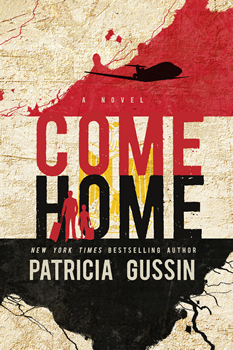 New York Times and USA Today best-selling author Patricia Gussin is a physician who grew up in Grand Rapids, Michigan, practiced in Philadelphia, and now lives on Longboat Key, Florida, with her husband Robert Gussin. She is the author of seven novels including Shadow of Death, Thriller Award nominee for Best First Novel, and After the Fall, winner of the Florida Book Award.
New York Times and USA Today best-selling author Patricia Gussin is a physician who grew up in Grand Rapids, Michigan, practiced in Philadelphia, and now lives on Longboat Key, Florida, with her husband Robert Gussin. She is the author of seven novels including Shadow of Death, Thriller Award nominee for Best First Novel, and After the Fall, winner of the Florida Book Award.
 Hundreds of mystery/thriller writers have met Linda Lovely at check-in for the annual Writers’ Police Academy, which she helps organize. Lovely finds writing pure fiction isn’t a huge stretch given the years she’s spent penning PR and ad copy. Writing lets her “disappear” the types of characters who most annoy her without the need to pester relatives for bail. Bones To Pick is her sixth mystery/thriller and the first in a new humorous mystery series.
Hundreds of mystery/thriller writers have met Linda Lovely at check-in for the annual Writers’ Police Academy, which she helps organize. Lovely finds writing pure fiction isn’t a huge stretch given the years she’s spent penning PR and ad copy. Writing lets her “disappear” the types of characters who most annoy her without the need to pester relatives for bail. Bones To Pick is her sixth mystery/thriller and the first in a new humorous mystery series.
 Tim Waggoner has published close to forty novels and three collections of short stories. He writes original fiction, as well as media tie-ins, and his articles on writing have appeared in numerous publications. He’s won the Bram Stoker Award, been a finalist for the Shirley Jackson Award and the Scribe Award, and his fiction has received numerous Honorable Mentions in volumes of Best Horror of the Year. He’s also a full-time tenured professor who teaches creative writing and composition at Sinclair College in Dayton, Ohio.
Tim Waggoner has published close to forty novels and three collections of short stories. He writes original fiction, as well as media tie-ins, and his articles on writing have appeared in numerous publications. He’s won the Bram Stoker Award, been a finalist for the Shirley Jackson Award and the Scribe Award, and his fiction has received numerous Honorable Mentions in volumes of Best Horror of the Year. He’s also a full-time tenured professor who teaches creative writing and composition at Sinclair College in Dayton, Ohio.
 Terrence P. McCauley is an award-winning writer of crime fiction and thrillers. The third novel in his University Series – A CONSPIRACY OF RAVENS – was published by Polis Books in September 2017. The other novels in the series, Sympathy for the Devil and A Murder of Crows were also published by Polis Books. Terrence has also written two award-winning novels set in 1930 New York City – Prohibition and Slow Burn.In 2016, Down and Out Books also published Terrence’s World War I novella – The Devil Dogs of Belleau Wood. Proceeds from sales go directly to benefit the Semper Fi Fund.
Terrence P. McCauley is an award-winning writer of crime fiction and thrillers. The third novel in his University Series – A CONSPIRACY OF RAVENS – was published by Polis Books in September 2017. The other novels in the series, Sympathy for the Devil and A Murder of Crows were also published by Polis Books. Terrence has also written two award-winning novels set in 1930 New York City – Prohibition and Slow Burn.In 2016, Down and Out Books also published Terrence’s World War I novella – The Devil Dogs of Belleau Wood. Proceeds from sales go directly to benefit the Semper Fi Fund.
 Stanley Trollip writes with Michael Sears under the name Michael Stanley. Their novels, featuring Detective Kubu, are set in Botswana, a fascinating country with magnificent conservation areas and varied peoples. The mysteries are set against current southern Africa issues such as the plight of the Bushman peoples of the Kalahari (DEATH OF THE MANTIS, shortlisted for Edgar and Anthony awards, won a Barry award in 2011), the pervasive power of witch doctors (DEADLY HARVEST, shortlisted for an ITW Thriller award in 2014), blood diamonds, the growing Chinese influence, and biopiracy. The latest book in the series is DYING TO LIVE.
Stanley Trollip writes with Michael Sears under the name Michael Stanley. Their novels, featuring Detective Kubu, are set in Botswana, a fascinating country with magnificent conservation areas and varied peoples. The mysteries are set against current southern Africa issues such as the plight of the Bushman peoples of the Kalahari (DEATH OF THE MANTIS, shortlisted for Edgar and Anthony awards, won a Barry award in 2011), the pervasive power of witch doctors (DEADLY HARVEST, shortlisted for an ITW Thriller award in 2014), blood diamonds, the growing Chinese influence, and biopiracy. The latest book in the series is DYING TO LIVE.
 Author and attorney Scott A. Lerner resides in Champaign, Illinois. He obtained his undergraduate degree in psychology from the University of Wisconsin in Madison and went on to obtain his Juris Doctor degree from the University of Illinois in Urbana Champaign. He is currently a sole practitioner in Champaign, Illinois. The majority of his law practice focuses on the fields of Criminal law and Family Law.Mr. Lerner lives with his wife, their two children, and their cat Fern. Mr.Lerner collects unusual antiques and enjoys gardening, traveling, reading fiction and going to the movies. Cocaine Zombies is his first published novel. Coming soon, the sequel: Ruler of Demons.
Author and attorney Scott A. Lerner resides in Champaign, Illinois. He obtained his undergraduate degree in psychology from the University of Wisconsin in Madison and went on to obtain his Juris Doctor degree from the University of Illinois in Urbana Champaign. He is currently a sole practitioner in Champaign, Illinois. The majority of his law practice focuses on the fields of Criminal law and Family Law.Mr. Lerner lives with his wife, their two children, and their cat Fern. Mr.Lerner collects unusual antiques and enjoys gardening, traveling, reading fiction and going to the movies. Cocaine Zombies is his first published novel. Coming soon, the sequel: Ruler of Demons.
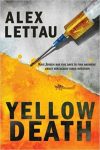 Alex Lettau is the pen name of Ludwig Alexander Lettau MD, a former medical epidemiologist with the CDC’s Division of Viral Diseases and current infectious disease specialist in Charleston SC where he lives with his wife Lisa, two daughters, and a Bouvier. His special interest as an author is infection-related medical thrillers. In his Indie award-winning thriller Yellow Death, the protagonist Kris Jensen becomes accidentally infected with an unknown lethal hepatitis virus and has only five days left to find answers to its origin.
Alex Lettau is the pen name of Ludwig Alexander Lettau MD, a former medical epidemiologist with the CDC’s Division of Viral Diseases and current infectious disease specialist in Charleston SC where he lives with his wife Lisa, two daughters, and a Bouvier. His special interest as an author is infection-related medical thrillers. In his Indie award-winning thriller Yellow Death, the protagonist Kris Jensen becomes accidentally infected with an unknown lethal hepatitis virus and has only five days left to find answers to its origin.
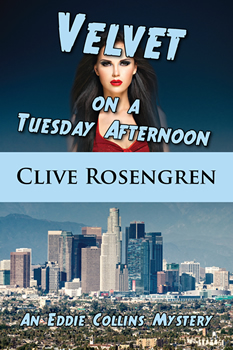 Clive Rosengren is the author of the Shamus-nominated novels Murder Unscripted and Red Desert, featuring Hollywood actor/private eye Eddie Collins. Third in the series, Velvet on a Tuesday Afternoon, was released on November 1. Clive spent most of the last forty years as an actor, pounding many of the same streets as his fictional detective. A favorite television credit is “Cheers,” where he played the only character to throw Sam Malone out of his own bar.
Clive Rosengren is the author of the Shamus-nominated novels Murder Unscripted and Red Desert, featuring Hollywood actor/private eye Eddie Collins. Third in the series, Velvet on a Tuesday Afternoon, was released on November 1. Clive spent most of the last forty years as an actor, pounding many of the same streets as his fictional detective. A favorite television credit is “Cheers,” where he played the only character to throw Sam Malone out of his own bar.
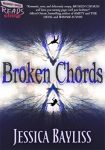 Jessica Bayliss is a clinical psychologist and fiction author of BROKEN CHORDS (Leap Books, October, 2017) and TEN AFTER CLOSING (Sky Pony Press, spring, 2018). Her agent is Dr. Uwe Stender of Triada US Literary Agency. She is the creator of PsychWRITE, a service that offers consultation and coaching for writers along with craft workshops and webinars.
Jessica Bayliss is a clinical psychologist and fiction author of BROKEN CHORDS (Leap Books, October, 2017) and TEN AFTER CLOSING (Sky Pony Press, spring, 2018). Her agent is Dr. Uwe Stender of Triada US Literary Agency. She is the creator of PsychWRITE, a service that offers consultation and coaching for writers along with craft workshops and webinars.
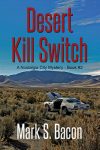 Mark S. Bacon began his career as a Southern California newspaper police reporter, one of his crime stories becoming key evidence in a murder case that spanned decades. After working for two newspapers, he moved to advertising and marketing when he became a copywriter for Knott’s Berry Farm, the large theme park down the road from Disneyland. Experience working at Knott’s formed part of the inspiration for his creation of the Nostalgia City theme park. Desert Kill Switch is the second book in the Nostalgia City mystery series that began with Death in Nostalgia City.
Mark S. Bacon began his career as a Southern California newspaper police reporter, one of his crime stories becoming key evidence in a murder case that spanned decades. After working for two newspapers, he moved to advertising and marketing when he became a copywriter for Knott’s Berry Farm, the large theme park down the road from Disneyland. Experience working at Knott’s formed part of the inspiration for his creation of the Nostalgia City theme park. Desert Kill Switch is the second book in the Nostalgia City mystery series that began with Death in Nostalgia City.
- LAST GIRL MISSING with K.L. Murphy - July 25, 2024
- CHILD OF DUST with Yigal Zur - July 25, 2024
- THE RAVENWOOD CONSPIRACY with Michael Siverling - July 19, 2024
